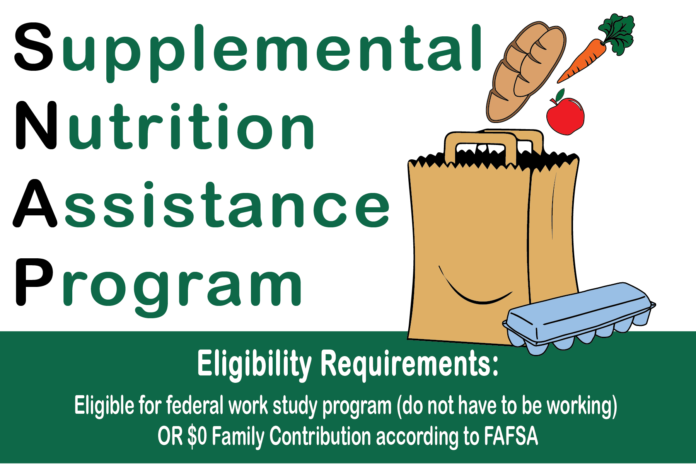Pennsylvania has begun implementing temporary changes for Supplemental Nutrition Assistance Program (SNAP) eligibility to allow more college students to utilize the benefit.
Previous eligibility requirements required students aged 18-49 and enrolled at least half time would not be eligible for benefits and offered minimal exemptions like having a disability or working a certain number of hours a week.
The new rules, which were signed into law on Dec. 27 as part of the Consolidated Appropriations Act of 2021, are part of the larger spending bill and Coronavirus relief legislation.
Now, students who are at least eligible for federal work-study or have a family contribution of $0 according to their Free Application for Federal Student Aid (FAFSA) can receive SNAP benefits.
Students who meet those qualifications and are under the age of 22 may also be counted as part of their family’s household if they receive SNAP, another change from previous guidelines.
Karla Fonner, director of student support, said changes to the rules would do nothing but benefit students.
According to Fonner, before the changes, almost no students would qualify for SNAP. Unable to qualify, Student Support would have had to help students through other avenues like Bob’s Cupboard.
“This opens up a whole new door for us,” Fonner said.
For students interested in applying for SNAP, they can do so online, but Fonner said the government process could be a little daunting, and those who may want help should submit a CARE referral. Doing so allows the student to help address their food needs and any other concerns like struggling to pay rent or utilities.
Fonner added that determining whether the student qualifies could be resolved in as little as 48 hours, but when they start receiving the benefit could be longer. In that case, the office could find supplementary sources for the gap between applying and receiving SNAP.
“Food insecurity is definitely one of those things where I feel like we’re all hands on deck,” Fonner said. “We want to make sure that students get what they need.”
While she did not know the specific numbers, Fonner said there had been an uptick in students who needed assistance with food security due to job loss and reduced hours and positions for on-campus employment.
In a press release from Feb. 8, Pennsylvania Department of Health Secretary Teresa Miller said SNAP enrollment had increased by 84,389 since February 2020.
Along with a 4.9% increase in SNAP recipients, Pennsylvania also saw a 12% increase in Medicaid enrollment in November.
A 2018 study conducted by the United States Government Accountability Office found nearly 2 million students who were eligible for SNAP benefits did not apply.
For Fonner, whether students seek assistance on their own, through Student Support or by other means like Bob’s Cupboard, she hopes students take advantage of the rule change while they can.
“I know it can be really difficult to ask for help or to admit that you might need benefits,” Fonner said. “So, I’m hoping that people can get themselves to a place where they feel a little bit more comfortable asking for help.”








